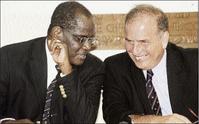Andre Wright, Night Editor 
Dr Hilton McDavid (left) converses with Professor Hal Klepak at his 'Cuba After Fidel' presentation at the University of the West Indies on Thursday night. - Nathaniel Stewart/Freelance Photographer
"My view is that if US policy will be to destabilise and destroy, then Cuba will choose a military man ... . If US policy changes to dialogue, it's open season, anything can happen," Hal Klepak, professor of history and warfare studies at the Royal Military College of Canada, said on Thursday night.
But Klepak, who delivered a lecture titled 'Cuba After Fidel' at the University of the West Indies undercroft, Mona, St Andrew, said that a number of factors, such as the 1996 Helms-Burton Act and the decades-long trade embargo, pose formidable challenges to resolution in the short term.
Diplomatic landmine
He also said Cuba's world view was a diplomatic landmine.
"Cuba's proposal to the world is costly to the US, on climate change, mutual respect ... things difficult for any great power, the only superpower," Klapek added.
Raul Castro, 76, who was elected president in February, is less charismatic and media-savvy than his older brother Fidel.
Fidel Castro, 81, a thorn in the US government's side for half a century who ruled communist Cuba with an iron fist, has retreated from public life since undergoing emergency intestinal surgery in July 2006.
"You have a man who I think would have wanted to have a different last years ... . This (accession to power) is about duty. He has stepped up to the plate largely because of that. He is deeply respected, and has loyalty from the top down," Klepak said of Raul.
Changing 'absurdities'
Although Raul is unlikely to spearhead wholesale reforms which run counter to the 1959 Cuban Revolution and the regime's socialism philosophy, Klepak insists that the new president is convinced of the need to brush aside what he terms "bureaucratic absurdities".
And since taking the reins of Cuba a year and a half ago, Raul has done just that.
On Monday, the government swept away its policy of limited access to cellphone technology by making mobiles accessible to ordinary Cubans, prompting citizens to swarm stores.
Weeks ago, the government also scrapped a ban against Cubans staying at hotels, a privilege formerly restricted to tourists. And restrictions on the purchase of agricultural equipment, once the domain of the government, have also been lifted.
Earlier this month, the government committed to granting titles to state-owned homes and unfreezing wage limits in a bid to drive national productivity.
Though the official government newspaper, Granma, has credited Fidel for the paradigm shift, comments in the press by the ex-president contradict that view.
But Raul's minor reforms, Klepak said, must not be mistaken as a signal of a second-tier leadership that will depart from the Communist Party's core doctrines.
"I believe the Fidelistas, as well as Raulistas, will ensure continuity," he said.
No stomach for revolt
While conceding that there was some disillusionment with Cuba's socialist policy by "youths anxious for change", Klepak said claims of imminent mass rebellion were unfounded political rhetoric.
"The suggestion that Cubans are waiting for the slightest moment to rise up is manifestly incorrect. There is no stomach in Cuba for violent revolt. There is great stomach for change, for reform," he added.
andre.wright@gleanerjm.com

